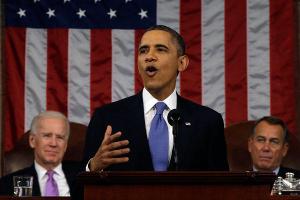By Daryl G. Kimball
 President Obama in the State of the Union Address Feb. 12: "America will continue to lead the effort to prevent the spread of the world's most dangerous weapons."
President Obama in the State of the Union Address Feb. 12: "America will continue to lead the effort to prevent the spread of the world's most dangerous weapons."
Barack Obama's State of the Union pledge to continue "to lead the effort to prevent the spread of the world's most dangerous weapons" represents a renewal of the President's commitment to pursue a step-by-step plan toward a world without nuclear weapons, which he first outlined in Prague on April 5, 2009.
In his address, the President made it clear that he will press forward to find a diplomatic solution to the most urgent nuclear proliferation challenge -- Iran -- just days ahead of the next round of talks between Tehran and the "P5+1" group, and that Iran must comply with its nonproliferation obligations.
To improve the chances of a breakthrough, the U.S. and P5+1 negotiators must adjust their tactics and focus on the most important, near-term nonproliferation goals: restricting (not permanently suspending) Iran's uranium enrichment and securing Iranian agreement to more-intrusive international inspections to ensure that Tehran has halted all weapons-related work.
The President also made it clear that the United States will continue to seek to reduce the size the still bloated U.S. and Russian nuclear arsenals. Today, the United States deploys some 1,700 strategic nuclear warheads and Russia deploys some 1,500 strategic warheads. Each side retains thousands more nuclear warheads in storage.
Most U.S. and Russian deployed strategic nuclear weapons are still poised for launch within minutes, which Obama has said "is a dangerous relic of the Cold War. Such policies increase the risk of catastrophic accidents or miscalculation. I believe that we must address this dangerous situation—something that President Bush promised to do when he campaigned for president back in 2000, but did not do once in office."
Further reciprocal reductions would reduce nuclear risks and increase our leverage on other nuclear-armed states to exercise restraint and join in serious multilateral disarmament discussions.
As a November 2012 report from the secretary of state's International Security Advisory Board suggests, with New START verification tools in place, further reciprocal U.S.-Russian nuclear reductions need not wait for a formal follow-on treaty. To jump-start progress, Obama could announce in the coming weeks that he is prepared to accelerate reductions under New START and, along with Russia, move below the treaty's ceiling of 1,550 deployed warheads.
And, contrary to hyperbolic claims of some, such reductions--perhaps to 1,000 or so deployed strategic nuclear weapons in the coming years--would have zero effect on America's ability to deter a nuclear strike by any current or future nuclear-armed state.
Other than Russia, China is the only other potential nuclear adversary that can launch nuclear weapons against the U.S. homeland and it possesses just 50 to 75 warheads on intercontinental-range missiles. Despite its latest nuclear test, North Korea has fewer than a dozen bombs of limited range. Iran has none and is years away from an effective arsenal if it chooses to pursue that path.
Just a single U.S. submarine armed with 24 missiles, each equipped with four 455-kiloton warheads, packs enough explosive power to kill tens of millions of people. The United States currently has 14 such subs and another 450 land-based missiles and 94 nuclear-armed bombers.
Scaling-back nuclear forces would also save tens of billions in taxpayer dollars. Existing U.S. Navy plans call for 12 new ballistic missile submarines with a lifetime cost of almost $350 billion. The Air Force is seeking up to 100 new, nuclear-armed strategic bombers that would cost at least $68 billion, as well as a new fleet of land-based ballistic missiles (price unknown).
U.S. ratification of the Comprehensive Nuclear Test Ban Treaty (CTBT) should also be a major nuclear nonproliferation objective for Obama's second term. As the president said in 2009, "After more than five decades of talks, it is time for the testing of nuclear weapons to finally be banned."
U.S. ratification of the CTBT would advance prospects for global entry into force; increase Washington's leverage with Iran, North Korea, and other states of concern; build momentum ahead of the 2015 Nuclear Nonproliferation Treaty Review Conference; and improve capabilities to detect and deter nuclear testing.
As with any treaty, securing Senate approval will not be easy. But with a sustained campaign like the one the administration waged for New START in 2010, approval of the CTBT is within reach before the end of 2014. Advances in stockpile stewardship and improvements in nuclear test monitoring make the technical case for U.S. ratification stronger than ever. There is substantial bipartisan support for the treaty, including from a number of former skeptics.
Progress on all of these fronts requires some degree of bipartisanship. Throughout the nation's history, reducing the threat from nuclear weapons has been and should remain a mainstream objective supported by Democrats and Republicans alike.
Presidents Eisenhower and Kennedy were the first U.S. presidents to seek to halt nuclear testing and were not the last. President Richard Nixon was the first to put the brakes on the U.S.-Soviet nuclear buildup, and every President since Ronald Reagan has reduced the size of the U.S. nuclear force, in tandem with Russia. President George H.W. Bush cut the American arsenal from 22,200 weapons to 13,700. And George W. Bush dropped it by about half -- from the 10,500 nuclear weapons he inherited from President Bill Clinton to just over 5,000 total warheads, including some 2,000 deployed strategic warheads.
Doing nothing in the face of persistent nuclear dangers is not an option. By taking the steps he outlined in the State of the Union Address to reduce the nuclear threat, President Obama would advance U.S. and global security, reinforce the beleaguered nuclear nonproliferation system, and establish a lasting nuclear security legacy.
